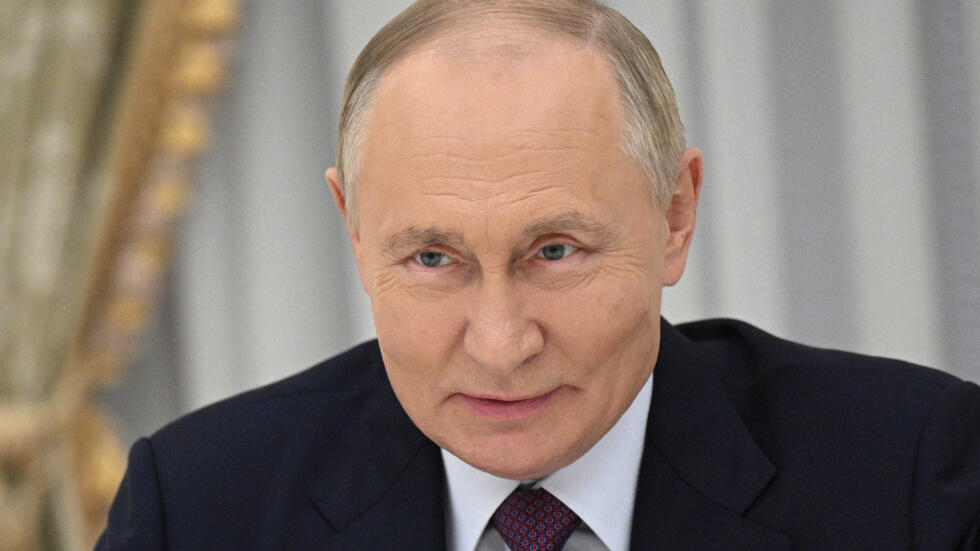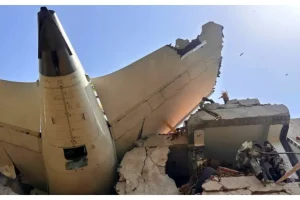
On Thursday, Russian President Vladimir Putin made a bold statement, asserting that Russia has the “right” to strike military targets in countries that supply weapons to Ukraine, particularly those that are enabling Ukrainian attacks against Moscow.
This remark came in the wake of a significant Russian missile strike on the Ukrainian city of Dnipro, which Putin justified as a direct response to the recent use of long-range missiles supplied by the United States and the United Kingdom. These missiles, which were used in attacks launched by Ukraine on Russian territory, had prompted Moscow to take decisive military action.
Putin’s comments were accompanied by a detailed explanation of the strike on Dnipro, revealing that it involved a new and highly advanced intermediate-range ballistic missile, which Russia has named “Oreshnik” (meaning “hazel” in Russian). The president stressed that this new missile weapon represents a significant advancement in Russia’s military capabilities and that it could be deployed not just in Ukraine but against the countries that are facilitating Ukraine’s missile operations. The president’s words carried a warning to those nations: any involvement in enabling Ukraine’s missile capabilities could make them targets of Russian retaliation.
In an effort to minimize civilian casualties, Putin announced that any future use of the “Oreshnik” missile would be preceded by advance warnings. This, he said, would allow civilians to evacuate the affected areas ahead of any military strikes. This development adds a layer of complexity to the ongoing conflict, as it suggests a calculated approach to targeting military facilities while aiming to avoid harming civilians. However, the announcement also sparked concerns about the potential for even more deadly confrontations, especially in areas where military installations are located in close proximity to civilian populations.
In addition to discussing the missile strike, Putin also took the opportunity to claim that Russian missiles would be able to easily bypass U.S.-supplied air defense systems, which have been deployed in Ukraine to counter Russian attacks. According to Putin, these systems would prove ineffective against Russia’s advanced missile technology, signaling Russia’s confidence in its ability to neutralize Western defense mechanisms. While this may be an attempt to project strength, it also reflects the high-stakes nature of the current military balance, as both sides continue to develop and deploy increasingly sophisticated weaponry.
The missile strike on Dnipro reportedly caused significant damage, hitting a missile factory, injuring two people, and damaging both a rehabilitation center and an industrial facility. Ukrainian officials have confirmed these details, with some reports suggesting that the damage could take months to repair. Ukrainian authorities also indicated that the missile was launched from the Astrakhan region in southern Russia, near the Caspian Sea, which further highlights Russia’s ability to carry out long-range missile strikes from its own territory deep into Ukraine. The precision and reach of these strikes are contributing to the growing fears that the conflict could spiral further out of control if such attacks continue.
This strike came at a particularly tense moment in the ongoing conflict, as tensions between Russia and the West have risen sharply in recent days. The catalyst for this escalation was the Biden administration’s decision to ease restrictions on Ukraine’s use of long-range missiles, enabling Ukrainian forces to launch strikes against Russian targets within Russia’s borders. This decision, which marks a significant shift in U.S. policy, has been met with strong condemnation from Moscow, which views it as an unjustified provocation. The new missile capabilities provide Ukraine with a strategic advantage, allowing them to target critical infrastructure deep within Russian territory, something that has not been possible with previous weaponry.
In addition to the missile strike, Putin took the opportunity to announce a new strategic doctrine, which further escalates the nuclear rhetoric coming from Moscow. Under the new doctrine, Russia reserves the right to use nuclear weapons in retaliation for any conventional military attack against its territory, particularly if such an attack is carried out by a nation supported by a nuclear power. This marks a dramatic escalation in Russia’s nuclear posture and raises the stakes in an already volatile conflict. The announcement has sent shockwaves through the international community, with experts warning that such rhetoric could increase the risk of a broader, more dangerous confrontation involving nuclear powers.
Ukrainian President Volodymyr Zelenskyy wasted no time in responding to Putin’s remarks. In a scathing critique, Zelenskyy called Putin’s threats a sign of fear and desperation, accusing the Russian president of resorting to extreme measures as his military campaign continues to falter. Zelenskyy argued that Russia’s continued aggression, including the missile strike on Dnipro and the targeting of civilians, only served to highlight the Russian leadership’s growing weakness. He also noted that Putin’s actions were becoming increasingly erratic, suggesting that the Russian president was trying to maintain control through threats and intimidation rather than through military victories.
Meanwhile, Western nations, including the United States and European powers, have condemned Russia’s actions as reckless and provocative. Many officials have accused Moscow of using nuclear threats as a form of psychological warfare aimed at intimidating Ukraine and its allies. This strategy, critics argue, is a desperate attempt to sow division and fear, particularly as Ukraine receives more support from Western countries. Western leaders have also expressed concern that Russia’s threats of nuclear retaliation could lead to catastrophic consequences if they are not contained.
As the fighting continues, Russian forces also launched an attack on the Ukrainian city of Kryvyi Rih, President Zelenskyy’s hometown, on Thursday. The assault injured at least 26 people and caused extensive damage to residential buildings and key civilian infrastructure, according to Serhii Lysak, the regional governor. The attack highlights the indiscriminate nature of Russia’s missile strikes, as civilian areas continue to be targeted in an attempt to weaken Ukraine’s resolve. The Russian Defense Ministry claimed that its air defenses successfully intercepted several Western-supplied missiles and drones, though it provided little information on the specifics of these interceptions.
The recent escalation in the conflict, particularly the increased use of Western weapons by Ukraine, has raised concerns among analysts about the potential broader implications for the war. While the easing of restrictions on Ukraine’s access to more advanced weaponry has undoubtedly strengthened its military position, experts are cautious about the long-term impact. Some argue that while these weapons may make it more difficult for Russia to maintain its hold on occupied territories, they are unlikely to fundamentally alter the trajectory of the war. Others suggest that the increased pressure on Russian forces could complicate their logistical operations and force a shift in strategy.
Peter Ricketts, a former U.K. national security adviser, noted that Ukraine’s use of Western weapons inside Russian territory has undermined the narrative put forward by the Kremlin, which has consistently argued that its military actions are justified, while labeling similar actions by Ukraine as an escalation. By using advanced weapons supplied by NATO countries, Ukraine is challenging Putin’s narrative and complicating Russia’s justification for continued aggression. This, Ricketts argues, could lead to further tensions between NATO and Russia, raising the prospect of direct conflict.
As the situation continues to evolve, Putin’s warnings that the development signals the potential for direct conflict between NATO and Russia are a cause for serious concern. The prospect of a broader confrontation looms large, with many fearing that the war could spill over into a larger regional or even global conflict if diplomatic efforts do not succeed in de-escalating the situation.





